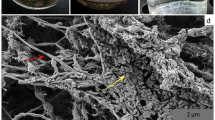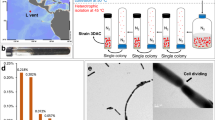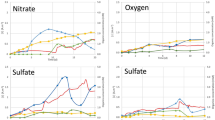Abstract
Several types of extremely thermophilic archaebacteria have recently been isolated from solfataric water holes, hot springs and hot sea floors1–6. It has been shown that some of them can live using sulphur respiration of reduced carbon substrates as a source of energy, a type of metabolism previously described for the eubacterium Desulfuromonas7. We report here that several extremely thermophilic archaebacteria can live with carbon dioxide as their sole carbon source, obtaining energy from the oxidation of hydrogen by sulphur, producing hydrogen sulphide. They are thus capable of a new type of anaerobic, purely chemolithoautotrophic metabolism, a possible primaeval mode of life.
This is a preview of subscription content, access via your institution
Access options
Subscribe to this journal
Receive 51 print issues and online access
$199.00 per year
only $3.90 per issue
Buy this article
- Purchase on Springer Link
- Instant access to full article PDF
Prices may be subject to local taxes which are calculated during checkout
Similar content being viewed by others
References
Zillig, W. et al. Zbl. Bakt. Hyg., I. Abt. Orig. C 2, 205–227 (1981).
Zillig, W. et al. System. appl. Microbiol. formerly Zbl. Bakt. Hyg., I. Abt. 4, 79–87 (1983).
Zillig, W. et al. Zbl. Bakt. Hyg., I. Abt. Orig. C 3, 304–317 (1982).
Zillig, W., Holz, I., Janeković, D., Schäfer, W. & Reiter, W. D., System. appl. Microbiol. formerly Zbl. Bakt. Hyg., I. Abt. 4, 88–94 (1983).
Stetter, K. O., König, H. & Stackebrandt, E. System. appl. Microbiol formerly Zbl. Bakt. Hyg., I. Abt. Orig. 4 (in the press).
Stetter, K. O. Nature 300, 258–260 (1982).
Pfennig, N. K., Biebl, H. Archs Microbiol. 110, 3–12 (1976).
Wolfe, R. S. & Pfennig, N. Appl. envir. Microbiol. 33, 427–433 (1977).
Laanbroek, H. J., Stal, L. J. & Veldkamp, H. Archs Microbiol. 119, 95–102 (1978).
Zillig, W., Schnabel, R., Tu, J. & Stetter, K. O. Naturwiss. 69, 197–204 (1982).
Fox, G. E. et al. Science 209, 457–463 (1980).
Tu, J. et al. J. molec. Evol. 18, 109–114 (1982).
Zillig, W., Tu, J., & Holz, I. Nature 293, 85–86 (1981).
Williams, H. & McBirney, A. R. in Vulcanology 319–346 (Freeman, San Francisco, 1979).
Brock, T. D., Brock, K. M., Belley, R. T. & Weiss, R. L. Archs Microbiol. 84, 54–68 (1972).
Stetter, K. O. et al. Zbl. Bakt. Hyg., I. Abt. Orig. C 2, 166–178 (1981).
Allen, M. B. Archs Mikrobiol. 32, 270–277 (1959).
Author information
Authors and Affiliations
Rights and permissions
About this article
Cite this article
Fischer, F., Zillig, W., Stetter, K. et al. Chemolithoautotrophic metabolism of anaerobic extremely thermophilic archaebacteria. Nature 301, 511–513 (1983). https://doi.org/10.1038/301511a0
Received:
Accepted:
Issue Date:
DOI: https://doi.org/10.1038/301511a0
This article is cited by
-
A review on anaerobic microorganisms isolated from oil reservoirs
World Journal of Microbiology and Biotechnology (2021)
-
The distribution, diversity, and importance of 16S rRNA gene introns in the order Thermoproteales
Biology Direct (2015)
-
What is an autotroph?
Archives of Microbiology (2012)
-
The self-organizing fractal theory as a universal discovery method: the phenomenon of life
Theoretical Biology and Medical Modelling (2011)
-
Stability of ribonuclease A under hydrothermal conditions in relation to the origin-of-life hypothesis: verification with the hydrothermal micro-flow reactor system
Research on Chemical Intermediates (2009)
Comments
By submitting a comment you agree to abide by our Terms and Community Guidelines. If you find something abusive or that does not comply with our terms or guidelines please flag it as inappropriate.



